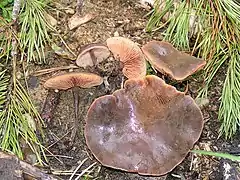| Macrocystidia cucumis | |
|---|---|
 | |
| Scientific classification | |
| Kingdom: | |
| Division: | |
| Class: | |
| Order: | |
| Family: | |
| Genus: | |
| Species: | M. cucumis |
| Binomial name | |
| Macrocystidia cucumis | |
| Synonyms | |
| |
Macrocystidia cucumis is a common, inedible mushroom of the genus Macrocystidia, often found in large numbers on needle litter or moist soil.
Description
The cap is convex to flat, dark red to blackish brown with a yellowish edge,[1] very much paler when dry and growing up to 5 cm (2 in) in diameter. The gills are white, later reddish and quite crowded. The spores are variable in colour: white, pink, brown have all been observed. The stipe is a similar colour to the cap, thin, and velvety at the base. The flesh is white and has a smell of freshly cut cucumbers.[2][3]
Distribution and habitat
Macrocystidia cucumis was originally described in Europe where it is most common, and it is also known from North America, Australia and New Zealand. It can be found in forests, disturbed grounds and gardens and its preferred substrate is wood debris.[4][3]
References
- ↑ Trudell, Steve; Ammirati, Joe (2009). Mushrooms of the Pacific Northwest. Timber Press Field Guides. Portland, OR: Timber Press. pp. 143–144. ISBN 978-0-88192-935-5.
- ↑ Edmund Garnweidner (1994). Mushrooms and Toadstools of Britain and Europe. HarperCollins. ISBN 978-0002199940.
- 1 2 "Macrocystidia cucumis March 2007". MushroomExpert.Com Web site. M. Kuo. Retrieved 2017-03-26.
- ↑ "Macrocystidia cucumis (Pers.) Joss. 1934". Global Biodiversity Information Facility. GBIF. Retrieved 2017-03-26.
External links